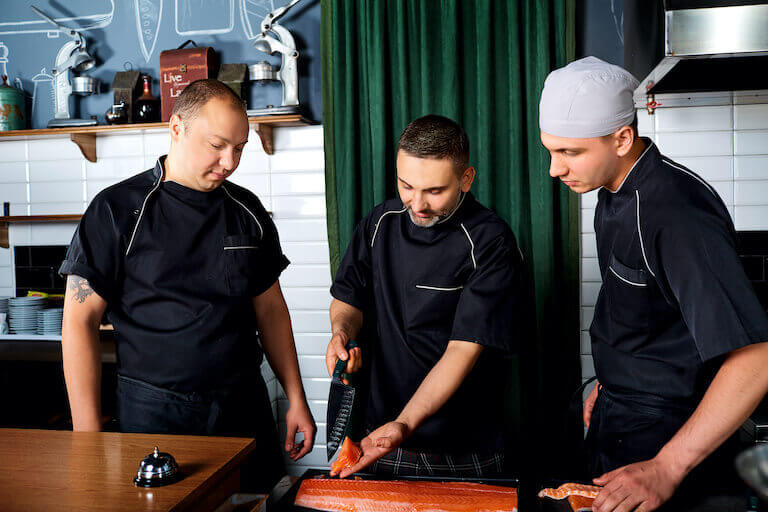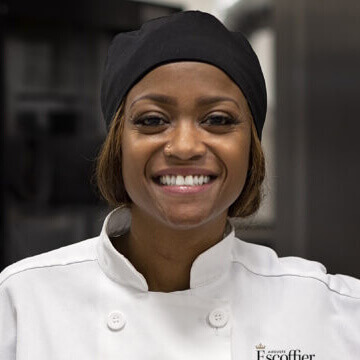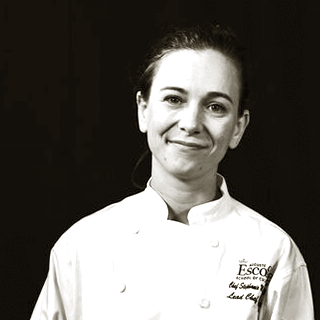Listen to This Article:
Do you love to lead as much as you love to cook? Does the idea of being in charge of an entire kitchen excite you? If so, becoming an executive chef or head chef could be the perfect move for your career.
But how do you determine which career path you want to pursue? These two roles have a lot of similarities—in fact, in many restaurants they are a single position, rather than two separate ones. But in restaurants that do employ both an executive and a head chef, there are some big differences in their responsibilities.
Before you start planning your next career goals, let’s take a look at what it means to be an executive chef vs. a head chef, and how you can determine which role is right for you.
What Is an Executive Chef?
First of all, it’s important to note that many kitchens do not employ an executive chef; instead, they’ll typically only have a head chef, who is responsible for handling most or all of the duties described below. Executive chefs generally only work at larger or higher-end restaurants, commercial kitchens, and restaurants with multiple locations—typically food businesses with larger budgets, and where the responsibilities would be too much for a single person.
That said, at restaurants that do make a distinction between executive chefs and head chefs, executive chefs are at the top of the kitchen hierarchy. They are responsible for making decisions that affect everything that happens in the kitchen, including what’s on the menu, where the ingredients are sourced, and how they should be prepared.

An executive chef’s duties go far beyond the kitchen, like sourcing and ensuring the quality of ingredients.
The nature of these responsibilities means that, even though “chef” is in their job title, they may rarely prepare the food. The traditional role of an executive chef is much more oriented toward management than cooking.
Nevertheless, it is important to have a strong culinary background to be successful in this role. Executive chefs will likely be responsible for creating dishes and managing kitchen operations; in order to thrive in this position, an aspiring chef should have significant experience working in restaurants, and may even want to pursue a culinary degree or other certification.
What Is a Head Chef?
In restaurants where these two positions are separate, head chefs are second in the kitchen hierarchy, just below executive chefs. While this role also has some administrative responsibilities, it’s a much more hands-on position; a head chef typically works in the kitchen, managing other chefs, handling some of the food preparation, and running the day-to-day operation of the kitchen.

A head chef must have broad culinary skills in order to be an effective leader.
In restaurants that don’t employ an executive chef, however, the head chef may also take on many of the responsibilities associated with that role. Because not all restaurants have an executive chef, when applying for a head chef position, it’s important to understand what the exact scope of the work will be.
Regardless of whether or not a restaurant has an executive chef, head chef is a versatile position that requires broad culinary knowledge and experience along with management skills.
What Are the Differences Between an Executive Chef and a Head Chef?
So, what do executive chefs and head chefs actually do, and how do their responsibilities compare? Let’s take a look at a few key areas to see how the responsibilities that fall into these two roles may differ.
Ensuring Quality
Both executive chefs and head chefs are responsible for ensuring the quality of the food their establishments serve—though in very different ways.
Executive chefs ensure quality at a high level. They are responsible for creating their restaurant’s menu, which involves deciding everything from what will be served to how it will be plated. Creating a great menu requires creativity, an up-to-date understanding of food trends, a broad knowledge of culinary techniques, and an investment in sourcing high-quality ingredients.

While executive chefs may design dishes, head chefs are responsible for preparing them.
Head chefs, on the other hand, are responsible for the quality of every dish as it leaves their kitchen. This means ensuring the quality of the food and its aesthetic presentation, and that their kitchen staff follows all food safety and hygiene practices. They must have the attention to detail to make sure each dish gets just the right finish of balsamic glaze or grated truffle, along with the foresight and management skills to train their staff effectively.
Monitoring Performance
Executive chefs and head chefs also have unique responsibilities when it comes to monitoring the business performance of their restaurant.
Executive chefs will likely be responsible for keeping an eye on changing food costs, monitoring the profitability of their menu offerings, and managing inventory. They are also likely to manage other aspects of the kitchen’s financial planning, like budgeting for staff and equipment. By attending to these big-picture concerns, executive chefs can help maintain the performance of their business and identify opportunities for growth.
Head chefs’ responsibilities in this area are much more hands-on. Since executive chefs are generally not in the kitchen as often, head chefs must be their eyes and ears on the ground. They are responsible for day-to-day inventory management, making sure their staff is storing and rotating stock appropriately to avoid spoilage.

Head chefs and executive chefs work together to monitor the profitability of their menu.
They should also pay attention to their customers’ dining habits; for example, if they notice that one dish frequently comes back half-eaten, they may be able to recommend that the portion size be changed, or the item be removed from the menu. This won’t necessarily be their decision to make, but their input could be invaluable in the process.
Managing Personnel
Executive chefs and head chefs are both involved in personnel management—but, again, in ways that are specific to their position.
Executive chefs are more likely to be involved in personnel management at the macro scale. Their duties may include setting staffing levels, creating policies and protocols, conducting performance reviews, and interviewing, hiring, and firing team members. It’s also worth noting that, as executive chef is the highest ranking position in the kitchen, the head chef is their direct subordinate; executive chefs are responsible for managing their head chefs’ performance, along with the rest of their staff.

Both executive chefs and head chefs have personnel management responsibilities.
Head chefs manage personnel with whom they work shoulder-to-shoulder. Even in restaurants that do employ an executive chef, the head chef is the highest-ranking person actually working in the kitchen. As such, their chief responsibility is managing the brigade de cuisine, the now-standard system of assigning kitchen duties developed by Georges Auguste Escoffier. In order to be able to manage so many different techniques, a good head chef must possess both extensive culinary knowledge and great management and communication skills.
In short, while an executive chef may not personally be in the kitchen much, they are likely responsible for making all the big decisions that allow it to run. Head chefs, on the other hand, work in the kitchen and are responsible for ensuring that all the pieces come together in support of the executive chef’s vision.
However, in restaurants that do not employ an executive chef, head chefs will take on many of the duties associated with that position as well—possibly sharing some of them with a restaurant manager, the business’s owner, or other high-ranking staff.
How Much Can an Executive Chef or Head Chef Earn?
While executive and head chef salaries may vary depending on employer, geographical location, and experience level, one thing generally holds true: these can be the highest-paid culinary positions. According to data gathered by the U.S. Bureau of Labor Statistics, the average salary for Chefs and Head Cooks (the category that includes executive and head chefs) is $56,520, with the highest earners reaching over $90,000.
Generally speaking, chef positions with more responsibilities can earn higher salaries. Executive chefs and head chefs who handle more of the executive duties may tend to land closer to the higher end of that salary spectrum, while head chefs working under an executive chef would typically earn less. But, again, the earning potential for both of these positions is based on a number of factors—the relative amount of responsibility being just one among them.
Which Role Could Be Right for You?
Both of these positions require an ongoing commitment to learning, years of experience, and possibly a culinary degree. But while executive chefs and head chefs work together closely and have some overlapping duties, the specific differences between the roles mean that, in restaurants where these are distinct positions, you may be better suited for one over the other.
Are You a Big-Picture Person?
Do you enjoy thinking about the big picture and making decisions with far-reaching consequences? If so, being an executive chef might be the right position for you. In this role, you’ll typically be responsible for decisions that affect the long-term success of your restaurant. While you do have day-to-day administrative duties, your biggest concern is the big picture.

Executive chefs make decisions that determine the way their kitchens run.
Do You Live to Cook?
Do you love working with food and being in the kitchen? A position as a head chef might be a better career choice, since an executive chef may spend less time actually cooking. While still a management position, as head chef you’ll be right there in the kitchen, working alongside your team to create good food that your customers will love.
What’s Your Management Style?
Both positions involve personnel management, but in different ways; think about which style of management you prefer as you consider whether executive or head chef would be a better fit for you. Are you better at crafting policies, conducting performance reviews, and enforcing standards? If so, executive chef might be the right role for you. Do you prefer working directly alongside the people you manage? Then you might be cut out to be a head chef.
Executive Chef vs. Head Chef: What’s the Bottom Line?
Here are the key differences between these similar, sometimes overlapping positions:
- Executive chefs make big-picture decisions that affect a restaurant’s operations, while head chefs lead from inside the kitchen.
- Executive chefs may rarely cook, while head chefs are the highest-ranking people in the kitchen and are directly involved in food preparation.
- Both positions involve some level of business management, with executive chefs’ duties being more systemic, while head chefs are more hands-on.
- In restaurants that do not have an executive chef, the head chef handles some or all of the executive chef’s functions.
Ready to Take the Next Step in Your Career as a Chef?
If you’re unsure which of these positions might be right for you, consider seeking mentorship from others in the culinary industry. Speaking directly with people who have been there already is a great way to understand what’s involved in these jobs—and which of them you might be a good match for.
No matter where you see yourself in the kitchen, pursuing a culinary degree can be a great way to help you get there. Escoffier’s on-campus or online programs can offer you hands-on experience, business training, and access to knowledgeable Chef Instructors—all of which can be valuable in helping you get closer to achieving your career goals.
Financial aid, grants, and scholarships are also available to those who apply and qualify, which can help bring your aspiration of leading a kitchen that much closer to reality.
If you liked this article, check these ones out next!
- 10 Common Interview Questions for a Chef Position
- Should I Go to Culinary School? A Guide for Deciding
- 7 Books All Chefs Should Read
*Information may not reflect every student’s experience. Results and outcomes may be based on several factors, such as geographical region or previous experience.




